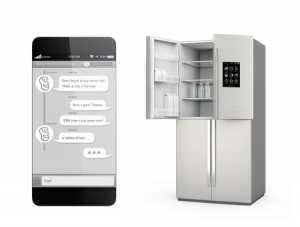For decades appliances just kept a low profile in our homes. They did what they exactly were expected to do – dishwashers – washed our dishes, fridges kept our food fresh, stoves helped us to cook delicious meals. They looked ok, saved a bit of energy and we were hoping they will not require too much repair too soon. At best they were expected to grow old without extra attention and added repair expense.

Now the basic home appliance functionalities such as warming up, cooling down, drying or washing, are simply taken for granted. The edge is off performance
nowadays. It is on the compatibility with apps and wifi technology instead. The wide range of the new features is the new standard.
So what exactly the Smart appliances can now do?
- Cycle control
- Remote cycle start
- Order supplies (rinse agent, detergent, or even food)
- Optimize energy usage (you can adjust the start of washing cycle to start during the off peak time use)
- You can see contents of your fridge remotely
- Voice control
- Play music, help you organize your life
- Self diagnostics
The advances in smart technology in household appliances are impressive for sure, but they do come with a higher price – as the smart technology is expensive, and requires not only hardware but software as well.
The presence of smart component makes them more delicate and vulnerable, as simple power surge can cause tangible damage. Now an appliance repair technician will have to be not only a good mechanic and familiar with electricity, but to deal with software troubleshooting as well. The truth is, the self diagnostic feature of smart appliances will make repairs somewhat easier, and might even help order parts and remind about routine service calls.
With the new technology comes the new challenges – connected to your WIFI, and being part of your home network smart appliances are an easy target for hacking and phishing attacks, as well as viruses. They are the easiest device to break into, and expose access to your credit card, banking and personal information.
Thinking to switch to smart appliances?
Do your homework first – not all smart features in appliances are as usable as they look in marketing materials and youtube promo demos. They sure do add to the cost, but will you be actually using them?
With the new features coming up the longevity of appliances is not a focus of attention anymore at design and production stage.
Chances are that the smart features and connectivity to the house network will become obsolete before its motor or heating elements break down. The manufacturers invest in research and technologies which make the unit more appealing to the customers more than in the design and durability of the actual mechanical parts. Who is going to ask about rpm when now you can actually talk to your washer?
You are assured now that monitoring your washer cycle from work is very useful, but really why exactly?
So it might as well happen that your old fridge will, in fact, serve you longer, with less malfunctions, and will have more longevity that the new one that is ready to help you via app ordering food and scheduling your life, but fails to do its direct duty because its mechanical part is not up to par.

